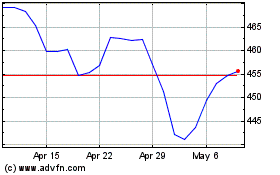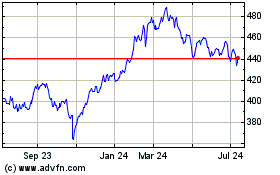By AnnaMaria Andriotis
Credit-card companies are hiking a range of fees that U.S.
merchants will pay to process transactions, a move likely to
inflame already fractious relations between many businesses and
card networks.
Visa Inc. and Mastercard Inc., the two biggest U.S. card
networks, are preparing increases to certain existing fees that
will kick in this April, according to people familiar with the
matter.
Some of the changes relate to so-called interchange fees. Card
networks set the price of these fees, which merchants pay to banks
when consumers shop with the cards they issue. Also due to rise are
fees that card networks charge financial institutions for
processing card payments on behalf of merchants.
Merchants often increase the prices consumers pay following such
fee increases, in an attempt to protect their own profits. Roughly
1% to 2.5% of prices for goods and services go to cover card fees,
according to people familiar with merchant pricing.
Consumers often pay for those fees whether they pay with cash or
card. While big in the aggregate -- merchants pay tens of billions
of dollars in card fees annually -- per-transaction changes are
often minuscule and so go largely unnoticed by consumers.
A Visa spokeswoman said "Visa's network fees are paid by our
financial institution clients and used to enhance the safety,
efficiency and innovation of our platform, and are set based on
market conditions and to reflect the value we deliver." She said
the new price changes impact fees that Visa hasn't adjusted in at
least three years.
A Mastercard spokesman declined to comment.
Separately, returned merchandise purchased using Mastercard
debit cards will in some cases become more expensive for stores,
according to a person familiar with the matter. In some
transactions, merchants won't be reimbursed for the interchange fee
that was paid on the initial transaction.
Meanwhile, Discover Financial Services, which is both a network
and a card issuer, is preparing to increase certain interchange
fees. This will include rewards credit cards used to shop at
restaurants and when certain Discover credit cards are used for
online shopping, according to a person familiar with the matter. A
Discover spokesman declined to comment.
Card fees are a long-running point of contention as consumers
shift more spending from cash to cards. Merchants say card-company
charges are exorbitant and that there is little they can do in the
face of price increases.
An additional bone of contention: Fees aren't uniform. A small
number of big merchants often incur lower fees due to the volume of
transactions they handle, including giant retailers such as
Amazon.com Inc., Walmart Inc. and Costco Wholesale Corp. that have
negotiated special arrangements, according to people familiar with
the matter.
For their part, card companies say credit and debit cards result
in more sales for merchants than would otherwise occur and that
expenses tied to fraudulent card purchases and other costs need to
be covered.
The pushback against card fees has been particularly pronounced
outside the U.S. In recent years, interchange fees on debit and
credit cards that are paid in many European countries have been
lowered and capped. Visa and Mastercard recently reached a proposed
settlement with European Union regulators to lower the interchange
fees merchants in the region pay on debit and credit cards issued
outside of the area.
In the U.S., the dollar amount of interchange fees paid by
stores, which has been surging in recent years, is at the center of
fights between merchants, card networks and large banks that issue
cards. Banks are the ultimate recipients of these fees; card
networks at times increase them so that banks will issue or retain
cards on their networks.
Those fees help fund the points and cash back that banks pay to
their cardholders when they redeem rewards. Card companies tend to
increase at least some interchange fees every few years, while
rewards programs have grown in popularity.
Large U.S. merchants, including Amazon, Target Corp., and Home
Depot Inc., are pursuing litigation against Visa, Mastercard and
large banks aimed at eventually lowering these fees.
Merchants paid an estimated $64 billion in Visa and Mastercard
credit and debit interchange fees last year, according to new data
from an industry publication, the Nilson Report. That is up 12%
from a year earlier and up 77% from 2012.
Other fees are on the rise, as well. Visa, the largest U.S. card
network, is increasing several fees in April, according to people
familiar with the matter. Unlike interchange fees that are paid to
card issuers, these fees are collected by Visa.
Visa raised its "credit-card assessment fee" this year by 0.01%
for most credit-card purchases made in the U.S.
While seemingly small on a percentage or flat-fee basis, the
increased fees that Visa will put in place during the first four
months of the year are expected to cost U.S. merchants at least an
additional $570 million through April 2020, according to estimates
by merchants-payments consulting firm CMSPI.
A Visa spokeswoman disputed the figure, saying it was inflated,
but didn't provide further detail.
But network fees aren't the only additional charges merchants
face. There are also other fees charged by firms that process
merchants' card transactions. Those, which include the network
fees, totaled $14.8 billion on Visa and Mastercard debit and credit
transactions in 2018, up 10% from a year earlier and 70% from 2012,
according to the Nilson Report.
Write to AnnaMaria Andriotis at annamaria.andriotis@wsj.com
(END) Dow Jones Newswires
February 15, 2019 05:44 ET (10:44 GMT)
Copyright (c) 2019 Dow Jones & Company, Inc.
MasterCard (NYSE:MA)
Historical Stock Chart
From Jun 2024 to Jul 2024

MasterCard (NYSE:MA)
Historical Stock Chart
From Jul 2023 to Jul 2024
